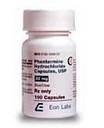|
zoloft weight gain Associated with significant weight gain zoloft weight gain, possibly secondary to interactions with the histamine (H1) receptor. It is not associated with gastrointestinal symptoms zoloft weight gain, sexual dysfunction zoloft weight gain, or increased heart rate zoloft weight gain, as seen with the SSRIs. Trazadone (Desyrel®) is an antidepressant with sedative properties that is frequently used as a sleep aid as well as treatment for depression. It appears to cause less weight gain than amitriptyline (Elavil®) but more than buproprion HCL (Wellbutrin®). There is currently no information available relating Nefazadone (Serzone®) to increased appetite or weight gain. Buproprion HCL (Wellbutrin®) has not been associated with weight gai zoloft weight gain.
zoloft weight gain N and is commonly used with some success in smoking cessation. Anticonvulsants Mood Stabilizers These drugs were initially used only for seizure disorders. The following anticonvulsants are now prescribed frequently in the treatment of bipolar disorder and other selected forms of depression: Carbamazepine (Tegretol®) Divalproex (Depakote®) Gabapentin (Neurontin®) Lamotrigine (Lamictal®) Topiramate (Topamax®) Anticonvulsants tend to cause hyperinsulinemia (elevated insulin in the blood) and increased appetite leading to weight gain. Hyperinsulinemia also results in increased testosterone zoloft weight gain, which causes a risk to women on these medications for development of Polycystic Ovary Syndrome (POS). Polycystic ovary syndrome can cause weight gain zoloft weight gain, male pattern baldness zoloft weight gain, increased facial hair zoloft weight gain, skin tags zoloft weight gain, acne zoloft weight gain, infertility zoloft weight gain, high blood pressure zoloft weight gain, abnormal lipid levels zoloft weight gain, and heart disease. Seizure disorder studies showed that patients taking anticonvulsants who had either a normal or below normal body mass index had the most severe weight gain. Conventional Mood Stabilizers Mood stabilizers were commonly used before anticonvulsants were developed for the treatment of bipolar disorder. Mood stabilizers commonly prescribed consisted primarily of the following: Lithium (Cibalith-S® zoloft weight gain, Duralith® zoloft weight gain, Ekalith® zoloft weight gain, Eskalith CR® zoloft weight gain, Lithane® zoloft weight gain, Litho.
zoloft weight gain Ycystic Ovary Syndrome (POS). Polycystic ovary syndrome can cause weight gain zoloft weight gain, male pattern baldness zoloft weight gain, increased facial hair zoloft weight gain, skin tags zoloft weight gain, acne zoloft weight gain, infertility zoloft weight gain, high blood pressure zoloft weight gain, abnormal lipid levels zoloft weight gain, and heart disease. Seizure disorder studies showed that patients taking anticonvulsants who had either a normal or below normal body mass index had the most severe weight gain. Conventional Mood Stabilizers Mood stabilizers were commonly used before anticonvulsants were developed for the treatment of bipolar disorder. Mood stabilizers commonly prescribed consisted primarily of the following: Lithium (Cibalith-S® zoloft weight gain, Duralith® zoloft weight gain, Ekalith® zoloft weight gain, Eskalith CR® zoloft weight gain, Lithane® zoloft weight gain, Lithob.
zoloft weight gain 
zoloft weight gain | | | | | |
zoloft weight gain
|

